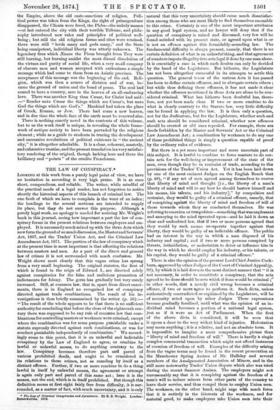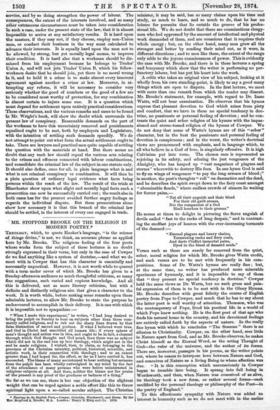THE LAW OF CONSPIRACY.*
LOOKIKG at this work from a purely legal point of view, we have no hesitation in according it very high praise. It is at once short, compendious, and reliable. The writer, while mindful of the practical needs of a legal reader, has not forgotten to notice shortly the historical aspects of this branch of criminal law. The one fault of which we have to complain is the want of an index; the headings to the several sections are intended to supply its place, but they do not answer this purpose. Although a purely legal work, no apology is needed for noticing Mr. Wright's book in this journal, seeing how important a part the law of con- spiracy forma in the present relations between employers and em- ployed. It is necessarily much mixed up with the three Acts which now form the ground of so much discussion, the Master and Servants' Act, 1867, and the Trades' Union Act, and the Criminal Law Amendment Act, 1871. The portion of the law of conspiracy which at the present time is most important is that affecting the relations between masters and men. As a part of the direct and general law of crimes it is not surrounded with much confusion. Mr. Wright shows- most clearly that this vague crime has sprung from a very small beginning. The original statutes, the first of which is found in the reign of Edward I., are directed solely against conspiracies for the false and malicious promotion of indictments for felony. The germ has gradually but very surely • increased. Still, at common law, that is, apart from direct enact- ments, there is in England no recognised law of conspiracy directed against trade combinations. The reeult of his in- vestigations is thus briefly summarised by the writer (p. 56) :— " The result of the whole appears to be that there is no sufficient authorityfor concluding that before the close of the eighteenth cen- tury there was supposed to be any rule of common law that com- binations for controlling masters or workmen were criminal, except where the combination was for some purpose punishable under a statute expressly directed against such combinations, or was for conduct punishable independently of combination." We accord- ingly come to this point, that it is an unlawful and indictable conspiracy by the Law of England to agree, or cembine by lawful or unlawful means, to do anything contrary to the law. Conspiracy becomes therefore part and parcel of various prohibited deeds, and ought to be considered in its relations to these crimes, not as standing by itself as a distinct offence. Further, if two or more combine to do a thing lawful in itself by unlawful means, the agreement or attempt is again only part and parcel of this same act ; Were it is the means, not the end, which is in itself prohibited. But though this definition seems at first sight fairly free from difficulty, it is sur- rounded, as a matter of fact, 'with much uncertainty, and it is only * The Law of Criminal Conepiracia and Agreements. By IL S. Wright London: Butterworth& 187&
natural that this very uncertainty should cause much dissatisfac- tion among those who are most likely to find themselves amenable to this crime. Certainty is one of the most important attributes in any good legal system, and no lawyer will deny that if the question of conspiracy is raised and discussed, very few will be found satisfied with its present state, or agreed upon what is or is not an offence against this formidably-sounding law. The fundamental difficulty is always present, namely, that there is no certain definition of what is an unlawful thing, and that agreement of numbers impute illegality into acts legal if done byone man alone. It is essentially a case in which such doubts can only be decided by the hand of the Legislature. But hitherto, the Legislature has not been altogether successful in its attempts to settle this question. The general tenor of the various Acts it has passed has been to define certain offences, and to abrogate certain others ; but while thus defining these offences, it has not made it clear whether the offences mentioned in these Acts are alone to be con- sidered criminal. What has hitherto been doubtful has, there- fore, not yet been made clear. If two or more combine to do what is clearly contrary to the Statute law, very little difficulty can be found in applying the law. It is then only a question, not for the Judicature, but for the Legislature, whether such and such acts should be considered criminal, whether new offences should be created or old ones repealed. For example, there are deeds forbidden by the Master and Servants' Act or the Criminal Law Amendment Act ; a combination by workmen to do any one of these prohibited things is simply a question capable of proof by the ordinary rules of evidence.
But there is a yet more important arid more uncertain part of this subject. It is lawful to combine to force masters to do cer- tain acts for the well-being or improvement of the state of the men, even though they be in restraint of trade, according to the provisions of the Trades' Union Act. Yet it has been laid down by one of the most eminent Judges on the English Bench that (p. 48), "if any set of men agreed among themselves to coerce that liberty of mind and thought [i e., the liberty of a man's liberty of mind and will to say how he should bestow himself and his means, his talents, and his industry],/' by compulsion and restraint, they would be guilty of a criminal offence, namely, that of conspiring against the liberty of mind and freedom of will of those towards whom they so conducted themselves. He was referring to coercion or etempulsion—something that was unpleasant and annoying to the mind operated upon—and he laid it down as clear and undoubted law, that if two or more persons agreed that they would by such means co-operate together against that liberty, they would be guilty of an indictable offence. The public had an interest in the way in which a man disposed of his industry and capital ; and if two or more persons conspired by threats, intimidation, or molestation to deter or influence him in the way in which he should employ his industry, or his talents, or his capital, they would be guilty of A criminal offence."
There is also the opinion of the present Lord Chief Justice Cock- burn, approved by other Judges of the Court of Criminal Appeal (p. 99), by which it is laid down in the mast distinct manner that "it is not necessary, in order to constitute a conspiracy, that the acts agreed to be done should be acts which if done would be criminal
in other words, that a merely civil wrong becomes a criminal offence, if two or more agree to perform it. Such dicta, unless authoratively contradicted or explained by the Legislature, will be of necessity acted upon by other Judges These expressions become gradually fossilised, until what was the opinion of an in- dividual mind becomes a portion of a national legal system, just as if it were an Act of Parliament. When the first of the above dicta is considered, it will be seen that it opens a door to the very widest kind of injustice. Molestation may mean anything ; it is a relative, and not an absolute term. It is impossible to imagine a more comprehensive phrase than "liberty of mind and freedom of will." There is hardly a single complex commercial transaction which might not afford instances of coercion of freedom of will. Examples of the difficulty arising from the vague terms may be found in the recent prosecution at the Manchester Spring Assizes of Mr. Halliday and several members of the Amalgamated Association of Miners, and in the still more noteworthy Trades' Union dispute which also was tried during the recent Summer Assizes. The employers might not unreasonably say that it is conspiring against the freedom of a man's will to induce miners from other parts of the country to leave their service, and thus compel them to employ Union men. The workmen, on the other hand, might urge with much force that it is entirely in the interests of the workmen, and for material good, to make employers take Union men into their service, and by so doing strengthen the power of labour. The consequences, the extent of the interests involved, and so many other extraneous circumstances must be taken into consideration in such a case, under the present state of the law, that it is almost impossible to arrive at any satisfactory results. It is hard upon -the masters, if they may not, if they choose, employ non-Union men, or conduct their business in the way most calculated to advance their interests. It is equally hard upon the men not to be allowed, by strong, but yet morally legal means, to improve their condition. It is hard also that a workman should be dis- missed from his employment because he belongs to Trades' Union A, and will not join Trades' Union B, which his fellow- workmen desire that he should join, yet there is no moral wrong in it, and to hold it a crime is to make almost every innocent agreement against another a crime at law. Moreover, in at- tempting any reform, it will be necessary to consider very seriously whether the good of numbers or the good of a few are to be considered most worthy of protection, for any combination is almost certain to injure some one. It is a question which must depend for settlement upon entirely practical considerations. "These observations, and the various remarks and cases to be found in Mr. Wright's book, will show the doubt which surrounds the present law of conspiracy. Reasonable demands on the part of the workman to have this uncertainty removed and punishments equalised ought to be met, both by employers and Legislature, with the intention of settling such demands speedily. We do not attempt to point out what form the actual settlement ought to take. There are lawyers and practical men quite capable of settling -the question with the materials at hand. But there seems no doubt that any such law should repeal the various acts relating -to the crimes and offences connected with labour combinations, and consolidate the criminal law of the subject in one statute only. It should also define, once for all, in plain language what is and what is not criminal conspiracy or combination. It will then be a plain question of ordinary legal evidence what facts bring persons within the reach of the law. The result of the trials at Manchester show upon what slight and morally legal facts such a prosecution can now be successfully carried out ; the result also in both cases has for the present avoided further angry feelings as regards the individual dispute. But these prosecutions alone show how necessary it is that this branch of the criminal law should be settled, in the interest of every one engaged in trade.







































 Previous page
Previous page